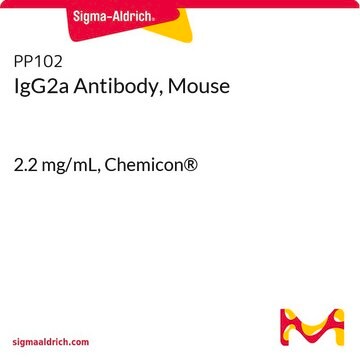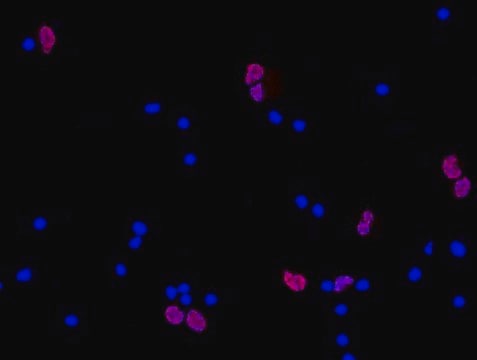Recommended Products
biological source
mouse
Quality Level
antibody form
purified antibody
clone
GC270, monoclonal
manufacturer/tradename
Chemicon®
concentration
0.5 mg/mL
technique(s)
flow cytometry: suitable
immunofluorescence: suitable
isotype
IgG2a
shipped in
wet ice
target post-translational modification
unmodified
Specificity
This antibody reacts with the outer membrane protein of some strains of Neisseria gonorrhoeae. No reaction with human cell surface or plasma components has been observed. However, some binding to Fc receptors may occur.
Immunogen
Protein I preparation from Neisseria gonorrhoeae.
Application
Mouse IgG2a is a monoclonal antibody intended for use as a negative control in immunofluorescence, flow cytometry, and immunoperoxidase staining on frozen and paraffin tissue sections. Its use enables an estimation of non-specific binding of mouse monoclonal antibodies to cell surface components in peripheral blood and tissue.
SUGGESTED USAGE
The control antibody should be diluted to the same concentration as the test antibody, and equivalent volumes used.
SUGGESTED USAGE
The control antibody should be diluted to the same concentration as the test antibody, and equivalent volumes used.
Research Category
Secondary & Control Antibodies
Epitope Tags & General Use
Secondary & Control Antibodies
Epitope Tags & General Use
Research Sub Category
Isotype Control Antibodies
Isotype Control Antibodies
Linkage
Replaces: CBL601
Physical form
Format: Purified
Purified from mouse ascitic fluid. The antibody is supplied in 0.5ml 25mM Tris-HCl, 0.4M NaCl, pH 8.0, containing 0.2% bovine serum albumin and 0.1% sodium azide. The characteristics of each lot are tested by electrophoresis, specific immunofluorescence assay and flow cytometry.
Storage and Stability
Store at 2 to 8°C, for up to 18 months. For prolonged periods, store below -20°C in undiluted aliquots. AVOID REPEATED FREEZE/THAW CYCLES.
WARNING: The monoclonal reagent solution contains 0.1% sodium azide as a preservative. Due to potential hazards arising from the build up of this material in pipes, spent reagent should be disposed of with liberal volumes of water.
WARNING: The monoclonal reagent solution contains 0.1% sodium azide as a preservative. Due to potential hazards arising from the build up of this material in pipes, spent reagent should be disposed of with liberal volumes of water.
Legal Information
CHEMICON is a registered trademark of Merck KGaA, Darmstadt, Germany
Disclaimer
Unless otherwise stated in our catalog or other company documentation accompanying the product(s), our products are intended for research use only and are not to be used for any other purpose, which includes but is not limited to, unauthorized commercial uses, in vitro diagnostic uses, ex vivo or in vivo therapeutic uses or any type of consumption or application to humans or animals.
WGK
WGK 1
Flash Point(F)
not combustible
Flash Point(C)
not combustible
Certificates of Analysis (COA)
Search for Certificates of Analysis (COA) by entering the products Lot/Batch Number. Lot and Batch Numbers can be found on a product’s label following the words ‘Lot’ or ‘Batch’.
Already Own This Product?
Find documentation for the products that you have recently purchased in the Document Library.
Cíntia da Silva Mello et al.
Memorias do Instituto Oswaldo Cruz, 112(6), 458-468 (2017-06-08)
Dengue fever may present hemorrhages and cavitary effusions as result of exacerbated immune responses. We investigated hydro-alcoholic extracts from leaves (UGL) and bark (UGB) of the medicinal species Uncaria guinanensis with respect to antiviral effects in Dengue virus (DENV) infection
Nicolae Ghinea et al.
Scientific reports, 14(1), 10176-10176 (2024-05-04)
Experimental evidence indicates that follicle-stimulating hormone (FSH), an essential hormone for reproduction, can act directly on endothelial cells inducing atherosclerosis activation and development. However, it remains unknown whether the FSH-receptor (FSHR) is expressed in human atherosclerosis plaques. To demonstrate the
Adenovirus E4orf4 protein-induced death of p53-/- H1299 human cancer cells follows a G1 arrest of both tetraploid and diploid cells due to a failure to initiate DNA synthesis.
Cabon, L; Sriskandarajah, N; Mui, MZ; Teodoro, JG; Blanchette, P; Branton, PE
Journal of virology null
Jing Ying Ma et al.
International journal of toxicology, 36(5), 386-394 (2017-08-19)
Immunohistochemical staining for the lysosome-associated membrane protein 2 (LAMP-2) has been proposed previously as an alternative to electron microscopy to identify hepatic phospholipidosis. This study used LAMP-2 immunohistochemistry (IHC) to diagnose phospholipidosis in rats exhibiting renal tubular injury. Rats were
Anna C Jones et al.
The Prostate, 72(11), 1159-1170 (2011-12-01)
Field cancerization denotes the occurrence of molecular alterations in histologically normal tissues adjacent to tumors. In prostate cancer, identification of field cancerization has several potential clinical applications. However, prostate field cancerization remains ill defined. Our previous work has shown up-regulated
Our team of scientists has experience in all areas of research including Life Science, Material Science, Chemical Synthesis, Chromatography, Analytical and many others.
Contact Technical Service







